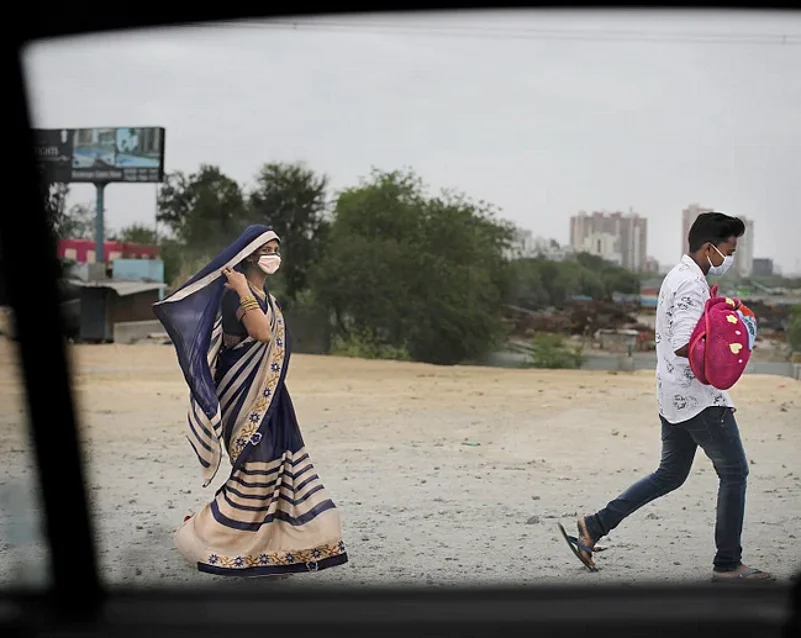Most of the discussions around Coronavirus pandemic are either gender-blind or gender-neutral because the arguments largely ignore the fact that the pandemic shapes gender relationships in general and renders differential treatment to women, especially in the social-cultural-economic realms. The mechanism of gender works not merely as a basic structural element of the society, but as an organising principle in the health sector. The outbreak does not only create a public health crisis but lays bare gender-based images and assumptions of women in the health workforce.
Women constitute two-thirds of the global health workforce, yet the gendered reality remains intact as a striking pattern across the world. A World Health Organization (WHO) working paper (2019) on ‘Gender equity in the health workforce’ mapped as many as 104 countries, revealed 70 per cent of workers in the health and social sector are women. The study also found: “Overall, an average gender pay gap of 28 per cent exists in the health workforce, once occupation and working hours are accounted for, the gender pay gap is 11 per cent.” Despite such stark disparities, nurses, female childcare and aged care workers and cleaning staff work on the frontline during the global pandemic situation.
Also, ‘biological differences’ between males and females are amplified through myriad forms of gendered responses to the pandemic by institutional dispensations. In fact, the arrangements of counter-measures to lethal coronavirus disease are considered masculine, the organisational task-based orientations are patterned through gender roles, which reproduce and legitimize gendered identities. It is in this context, the implications of Covid-19 pandemic on women’s health are extremely significant.
As cities around the world have gone into lockdown and quarantine mode, the reports of an alarming rise in domestic violence are mostly related to Coronavirus pandemic. The increased threat of gendered violence during public health emergencies becomes a nightmare for female victims. Amid the Coronavirus epidemic, women’s vulnerabilities across the world are aggravating the pre-existing gender-based susceptibilities.
There is no doubt that the pandemic accelerates economic stress among the low-income households. As a result, women in these households are the worst-hit. Outbreaks like Covid-19 forced overtly populous countries like India to go under lockdown coupled with social distancing norms. Unsurprisingly, the lockdown brought to light the sharp spike in domestic violence cases due to income stresses. In emergent public health emergencies, women’s increased financial dependence on the male members bolsters the patriarchal norms of households. The gendered architecture of families furthers the process of marginalization of women in the family. Huge economic uncertainties due to pandemic increase women’s fragility that exposes them to face the increased unemployment. David Evans, Senior Fellow at Centre for Global Development indicated four grave concerns in the time of epidemic: Sexual health, intimate partner violence, the burden of care and economic crises. The most disturbing concern is that global health institutions and national governments barely address the gendered implications during the epidemic outbreak.
The paternalistic regulations of religions have also subjugated women in India. For example, the ancient Indian text, Manusmriti, determines the moral yardsticks for women through sermons. In Islam, the so-called moral guardianship is reposed in males. Women are victims of gendered spaces that are monitored by deep-rooted patriarchal prejudice.
In a Thompson Reuters Foundation Survey (2018), India has been named ‘world’s most dangerous country for women due to high risks of sexual violence’. Also, experts said, ‘India moving to the top of poll showed not enough was being done to tackle the dangers women faced’. The public health emergencies make women’s conditions all the worse. Sexual and reproductive health of women are paid little attention to during pandemics. The United Nations Population Fund (UNFPA) in a technical brief (2020) titled ‘Covid-19: A gender lens’ stated, “The provision of family planning and other sexual health commodities including menstrual health items may be impacted as supply chains undergo strains from the pandemic.”
As Indians are living under extended lockdowns, gendered norms have been laid bare. In times of social distancing and quarantine, National Commission for Women (NCW) has received several calls of domestic violence across the country. The situation escalated to such an extent that the NCW had to launch a WhatsApp number besides online complaints as the lockdown has exposed women to potential perpetrators and abusive intimate partners. The households provide an enabling environment to justify the coercive and controlling behaviours of men over women, and there is hardly any escape route for the later despite the fact that it impacts women’s mental and physical health. So, they reluctantly opt to stay back.
Since public health emergencies are not gender-neutral, it’s time to devise a gender-balanced response to fight the Covid-19 pandemic. To combat coronavirus, governments around the globe have put in place harsh social distancing measures without addressing the blind spots of gendered distress. The already stigmatised women’s role in the public sphere is aggravated by the epidemic. Post Covid-19 situation may bring more and more behavioural and mental changes among women with huge post-traumatic stress.
Policy decisions need to articulate gendered concerns during public health emergencies because gender-sensitive pandemic planning may substantially mitigate these concerns.
(Subhajit Naskar is an Assistant Professor at the Department of International Relations in Jadavpur University. He has completed an integrated MPhil/PhD from the Centre for South Asian Studies of School of International Studies at JNU. Views expressed are personal.)
















